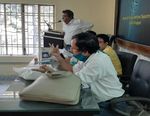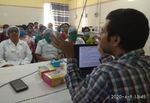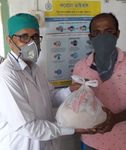State TB Cell Health and Family Welfare Department Government of West Bengal
←
→
Page content transcription
If your browser does not render page correctly, please read the page content below
State TB Cell
Health and Family Welfare Department
Government of West Bengal
West Bengal Cares for persons with TB during Covid-19 pandemic
1. Background
COVID 19 pandemic is an unprecedented public health emergency that calls for strict containment and mitigation strategies
to stop transmission of the virus and reduce burden on the health system. Unlike any other public health emergency, the
mitigation strategies like restrictions on movement and social distancing leads to disruption in routine health care delivery.
Repurposing the TB Health workforce towards combating the new disease is another challenging situation for the TB
program.
West Bengal foresaw a need for having strategies in place to hold the reign of TB services ever since the 1st case of COVID
19 was diagnosed on 18th March in the state. It was predicted that services would be affected greatly from April onwards.
Five commitments led to the efforts made-
➢ Providing uninterrupted services to already Notified TB patients
➢ Keeping NTEP health workforce motivated
➢ Fortnightly monitoring various service deliveries related to the diagnosis and care continuum of TB patients and
reflection of the same to Nikshay / Aushadhi
➢ Increasing TB case detection
➢ Planning beyond Lockdowns
Here is an attempt to describe the efforts in two phases. Necessary advisories are being issued, coupled with Video
conferences explaining them and taking stock.
2. Phase 1: End of March to end of May
➢ Commitment 1- Providing uninterrupted services to already Notified TB patients
o Drug requirement forecasting and taking necessary steps to fill up gaps
o Home delivery of ATD from PHI till 15th May at first, then extending it to 15th June or till Outcome is due whichever
is earlier-
▪ In order that vulnerable TB patients with compromised lung status do not have to venture out of their homes
to prevent co-infection with SARS CoV-2
▪ Prevent difficulties to travel during lockdown
o Phone calling every patient at least once in 10 days to counsel and ensure adherence
o Usage of IT technology (99 DOTs sleeves) wherever possible
o State ensured all PHI OPDs, DMCs, CBNAAT sites and C&DST laboratories remain functional, by restricting leave
and arranging conveyance for staff-
▪ Prevent delay in initiation of already diagnosed TB patients, managing Adverse Drug reactions and
ensuring follow up tests
▪ Medicines could be provided to patients who had initiated TB treatment elsewhere (throughout the
country) but were stranded due to lockdown at their residence in state.
▪ Ensured availability of medicines through quick transportation of ATD from State / District Drug stores to
each and every decentralized drug depoto Advisory sent to districts on testing of Priority samples as mentioned below-
▪ Samples of Presumptive DS and DR TB for diagnosis (special look out for PLHIV, Paediatric and Extra
pulmonary samples)
▪ Follow up sample—
a. DS TB- End treatment follow up
b. H Mono Poly- Smear at the end of 4th month and end of treatment. If any smear is positive send for NAAT
and CDST as per guidelines.
c. Shorter Regimen: Smear at the end of 4th month and end of treatment. If found positive at 4th month and
IP is extended, then smear at end 6th month. If any of the smears are positive send for CDST as per
guidelines.
d. All oral longer Regimen (MDR and additional resistance): Culture at the end of 4th month. If culture
negative, then IP is not extended and culture will be done at 9th month and end of treatment. If culture
positive at 4th month, Lzd dosage is not reduced for 2 more months ie till 8th month. Culture at 8th, 9th
month and end of treatment. If culture remains positive shift to DST guided regimens.
All other investigations for DR TB patients will be done as per guidelines, if patients can attend the PHI. Districts has to
make all out arrangements for collection and transportation of the priority samples from TB patients using NTEP 2 / 4
wheelers, any Govt or Private vehicles as feasible. In addition, samples may be carried to CBNAAT / CDST labs along with
samples from suspect Covid 19 patient.
Date Advisories from Directorate / State TB Cell
25.3.20 Provision of ATD to TB patients during lockdown till 15th May
Fortnightly reporting of DMC and CBNAAT utilisation
2.4.20
Prompt updating of Nikshay and Aushadhi
22.4.20 Modalities of sample transport
Priority samples for testing- diagnosis and Follow up
27.4.20 Testing samples for TB in presumptive COVID
CBNAAT machines to be used for COVID testing
Provision of ATD till 15th June
11.5.20 Status of NTEP staff deployment for COVID activity for advocacy purpose
Stocking ATD and procurement of lab reagents for use after lockdown
13.5.20 Regular attendance of all categories of staff at STC and STDC
22.5.20 Integrated TB & COVID screening guidance document
Performance of NTEP in districts from Jan to May 15th in comparison to previous year's performance
24.5.20
and targets
27.5.20 Re-purposing staff from NUHM, IDSP, ICDS for COVID activities and not only NTEP staff.
If necessary NTEP staff to be re-purposed partially in the same area of posting so that TB work is not
hampered
28.5.20 Hasten recruitment of NTEP staff to fill up vacancy
Districts responded to the above in the following ways—
1. Vehicles hired at available market rates to carry sputum samples from home / PHI to DMC / CBNAAT sites and to
CDST labs. Postal system that was never used before was used by 2 districts. NGOs and other transporters were
provided enhanced payments in some instances.2. Contrary to pre-COVID directives it was seen that fixing days for sample collection and transportation for any
particular TB Unit was quite feasible and cost effective during the lock down phase.
3. 93% TB patients could be provided with a month’s TB medicines at their homes. Average delay between diagnosis
and treatment initiation was seen to be 6, 4 and 2.5 days respectively in March, April, and May.
4. Ensuring delivery of ATD to Quarantined / Isolated TB patients
2.9 2.9 2.9
14.3
48.6
28.6
With 100% PHI have ensured ATD supply
With 80-100% PHI have ensured ATD supply
With 60-80% PHI have ensured ATD supply
With 40-60% PHI have ensured ATD supply
With 20-40% PHI have ensured ATD supply
Home Delivery of ATD % of TB Unit that ensured drug supply to patients
5. First 2 weeks of Lockdown was utilised by staff to update PHI profiles in Nikshay
Message from State TB Cell—
MAINTAIN RECORDS. ENTER DATA IN NIKSHAY WITHIN 24 HOURS OF EVENT. USE ANY DEVICE- SMART
PHONES, TABS AND INSTITUTIONAL COMPUTERS AND LAPTOPS
6. Leveraging alternative resources for TB patients-- Nutritional support was arranged in several blocks through
Panchayat and BDOs. Ensuring daily injection for DRTB patients involving rural health practitioners, collection of
follow up samples from DRTB patients engaging community volunteers
Provision of Ration for TB patients during Lockdown
7. Strengthening of follow up and UDST – Though the total examined cases in DMC dropped down to a major extent,
the follow up care provided in April 2020 was quite commendable. On an average 11000 follow up samples are
tested monthly in state and the figure for April 2020 was 10073, a decrease of mere 8%.
Delay in testing samples at CBNAAT site was reduced to 2.7 days in May from 12.6 days in February 2020Trend of delay in days from Microscopy to
Uptake of UDST
CBNAAT test for smear positive patients
14 71%
12 12.6 70% 65% 65% 63%
10
10.9
8 50%
6
4 4.7 30%
2 2.7 1st Quarter April
0
2019 2020
Feb Mar Apr May
➢ Commitment 2: Keeping NTEP health workforce motivated
By May end almost all NTEP staff were engaged either fully or partially in a variety of COVID activities.
o State TB Cell made sure that all NTEP health workforce get trained on basics of the new disease to allay fear
among them.
o Made arrangements so that all get the appropriate PPE that is required.
o An arrangement was made that staff worked on alternate 7 days.
NTEP staff at Registration counter for Migrants
and during Containment activities
o Conducting visits and holding District wise VCs with the entire NTEP staff from state level to know their work
routine, their concerns and apprehensions and solving their problems with District Chief Medical Officers
o Using social media platform to disseminate important messages among all NTEP staff
Supervisory visits by State TB Officer and NTEP Consultants along with COVID activitiesFrom COVID Control Room duties to training on
IPC- All efforts are a team work
Conducting VC Review and sensitising on TB
and COVID with NTEP staff
➢ Commitment 3- Fortnightly monitoring various service deliveries related to the diagnosis and care continuum
of TB patients and reflection of the same to Nikshay / Aushadhi
o To understand accessibility of diagnostic services, fortnightly data was collected from each DMCs and CBNAAT
sites. Analysis was done and shared with districts so that there is vigilance.
As expected, there was no reduction in microscopy or CBNAAT services between Jan to March 2020, as compared to the
same months in 2019. In the first fortnight of April it was seen that microscopy services were reduced by 64% to what it
was in April 2019 and that of CBNAAT uptake by 57%
As a ray of hope we found that uptake of services (DMC and CBNAAT) increased in the 2nd fortnight of April for few districts
after quick review and issue of advisories from State TB Cell. However, it again received a setback when more and more
lab technicians and NTEP staff got repurposed for sample collection and organizational services due to the homecoming
of migrants from different parts of India to the state. And in mid-May, it was seen that microscopy services were reduced
by 67% to what it was in May 2019.
Notification in April 2020 was only 40% of what was in April 2019. UDST stood at 63% and DBT at 7% in April 2020.
As if COVID was not enough, Kolkata and 4 Southern districts got battered with Super Cyclone Amphan on 20th
May with wind speed 130 to 190 km/hour, leaving behind a trail of devastation not seen in living memory. Millions
of people got displaced and are placed in cyclone shelters where social distancing is far from possible. Even after
7 days, parts of Kolkata, a prime Metro City in India, were still without electricity.3. Phase 2: End of May to July
➢ Commitment 4- Increasing TB Case detection
The above findings prompted state to take up the “NOW or NEVER” policy for increasing TB case detection.
o Club Presumptive TB Screening with H-T-H surveillance for COVID collaborating with IDSP
o Awareness regarding ways to prevent TB transmission in community along with COVID IEC campaigns
o At least 1 CBNAAT site in each district is being fitted with a Bio Safety Cabinet (BSC) Class II A2, so that
apprehensions of Lab personnel are allayed while testing samples of presumptive TB patients
o At least 2 rounds of TB testing to be done at CBNAAT sites doing COVID testing
o One round of Active Case Search program in Green Zones in June
o Collection of Priority samples and arrangements for transportation by any means
o Vacancies to be filled up at the earliest.
o Deploying Non NTEP LT for Tru Nat testing of COVID samples
o To protect staff, Tru Nat labs are also being placed at sites that have the above BSC facilities
State launched the Integrated TB and COVID Screening Plan on 23rd May in the entire state by issuing guidelines on the
same. The Director of Health Services reviewed the program on 27th May and trained the Chief Medical Officers, District
Nodal persons for COVID and NTEP program managers. Secretary Health appealed to all Districts that NTEP staff if re-
purposed for the current pandemic, should be done judiciously and not at the cost of TB program.
Local newspaper- Coverage on Integrated TB and COVID Screening activities
Integrated TB and COVID Screening Plan, devised in collaboration with IDSP has 3 components-
• Searching for TB cases in community during H-t-H activities
• Searching for TB cases in Fever clinics, Quarantine and Isolation centers
• Searching for TB cases at all Levels of COVID Hospitals
Samples for testing TB taken from presumptive COVID / COVID + patients would be tested in CBNAAT sites that have
BSC class II A2. Samples from patients without COVID symptoms (especially for UDST) are being done at sites without
BSC with proper PPE for lab personnel.
2 columns were added to the formats that are being used by ASHA and other volunteers for H-t-H activities for searching
cases of ILI and SARI in the community. Reporting formats have been devised to catch data regarding uptake of services
from Microscopy and CBNAAT centers.IEC materials on TB and Combined TB and COVID
District Program Managers along with NTEP Consultants watching with rapt attention the call for ‘Now or Never’
policy and Integrated TB and COVID Screening Plan by Secretary and Director of Health Services
➢ Commitment 5- Planning beyond Lockdowns
o Triaging and segregation for Fever and Cough to be practised at ALL Health institutions throughout the year
o Provide 2 cloth mask to any coughing persons attending OPD and Audio / visual aids in triage area for IEC
o Defunct Xray machines to be repaired, Non-Functional Microscopy centers to be made functional
o Sustained Massive IEC campaigns in community and Local governing bodies
o Identify a person in each Panchayat / village who can be reached by community for providing guidance to
presumptive TB and TB patients- Akshay Sathi
o Start TB surveillance among Health staff systematically
It is important to:
• Stand in solidarity and with resilience in the fight against these two respiratory diseases: TB and COVID-19
• Understand isolation, stigma, and challenges people face in epidemics, and stand with vulnerable groups
fighting COVID-19
• Recognize that people with TB are vulnerable to COVID-19, and ensure access to TB prevention, diagnosis and
treatment
• Support health workers and heroes fighting TB and COVID-19
________________________________________________________________________________________________You can also read



























































